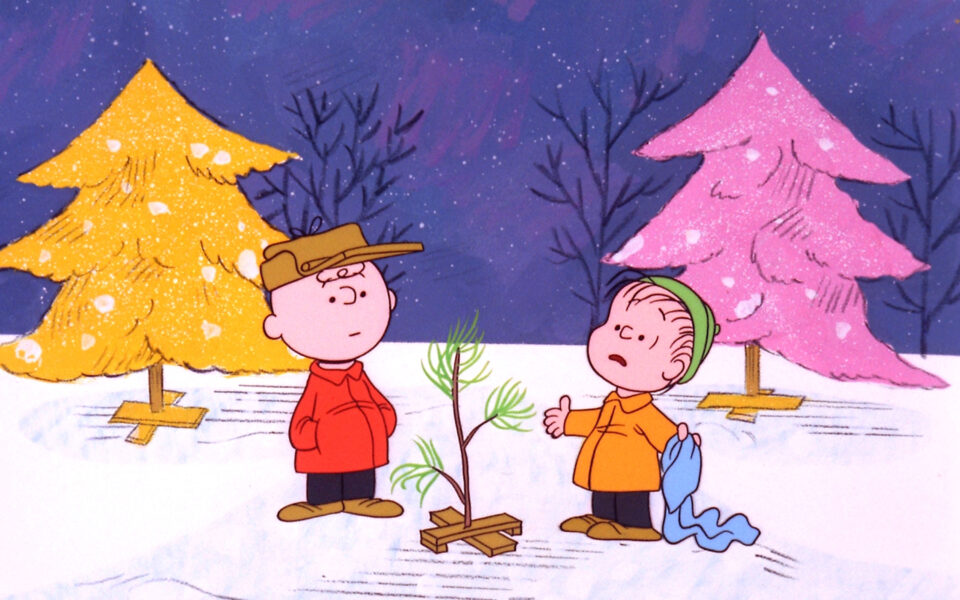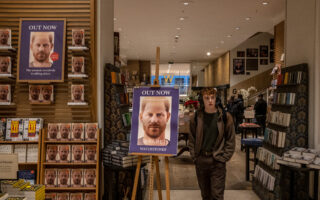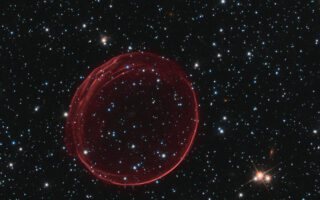‘A Charlie Brown Christmas’ is a Hanukkah classic

“A Charlie Brown Christmas,” based on the Peanuts comic strip by Charles Schulz, was a one-of-a-kind wonder when it premiered on television in 1965, and remains so almost 60 years later. Unlike the other jingle-belled baubles that television throws down the chimney each year, it is melancholy and meditative. The animation is minimalist and subdued, full of grays and wafting snowflakes. I could wrap myself in the Vince Guaraldi jazz score like a quilt.
And then there is the speech.
Charlie Brown, after a disastrous attempt to direct a school pageant and the adoption of an anemic Christmas tree, despairs over the crass materialism of the holiday and pleads for someone to tell him “what Christmas is all about.”
His friend Linus volunteers: He stands on a spotlighted stage and, as the soundtrack goes dead silent, recites a passage from the Gospel of Luke in which a band of angels proclaim the coming of Christ the Lord.
I have known people for whom the speech is a deal breaker. It is too much Christianity for them, too directly preached. (This is not a “those were different times” thing, either; in 1965, producers were convinced that putting the Bible on television would be a disaster.) Some objectors are nonbelievers, some are Christian but not devout.Some are, like me, Jewish.
I can understand. I do not personally believe that the physical embodiment of God was born in a Bethlehem stable, announced by a choir of the heavenly host, any more than I believe in Santa Claus.
Yet this year, just in time for Hanukkah, I still watched “A Charlie Brown Christmas,” one of my favorite programs ever made – in part because of how frank it is about being Christian. And in part because it is more Jewish in spirit than you may think.
My mother was a Jewish immigrant from Morocco. My father was an American Catholic – not very religious, but he took me to church with him. It was important to my mother that her children fit in within our heavily Christian, Midwestern American town, not unlike the town in “A Charlie Brown Christmas.” At Christmas, we had a tree and a Santa figurine.
I never felt excluded from Christmas, or – as a reader of Schulz’s Peanuts collections – from “A Charlie Brown Christmas.”
As I got older, I stopped going to church. I identified ethnically and culturally as Jewish, more so once I moved to New York, the finest place on Earth to be a nonpracticing secular Jew, and married into a Jewish family. I do not go to temple, but I fry a great Hanukkah doughnut.
Yet I never gave up “A Charlie Brown Christmas.”
For all of the Snoopy high jinks and slapstick, “A Charlie Brown Christmas” is as close to poetry as television gets. If Irving Berlin and other great Jewish musicians could compose some of America’s favorite Christmas songs, surely I can look past a few New Testament verses.
But honestly, I appreciate the Peanuts special more for how it deals directly with Christianity. It is sincere and radically earnest, without any interest in converting anyone. This is just what Christmas is, a ubiquitous celebration based in a faith that I do not share but that I can appreciate, the way I can appreciate the art of plenty of other cultures.
There is more to it, though. The older I get, the more I wonder if the characters actually read to me a little bit Jewish.
Notwithstanding his Gospel quotes, Linus, my favorite character, has many attributes of the Brainy Jewish Friend archetype, like Ross Geller of “Friends.” He analyzes and overanalyzes, talking Charlie Brown through his depressions and existential confusion. He nurses his anxieties and neuroses, carrying his security blanket like an emblem of strength (capable of whipping a snowball like David’s slingshot). Every Halloween, he forgoes the celebration of the larger community around him and awaits a messiah.
If not a Jewish surrogate, Linus at least carries himself like your brainy, philosemitic Christian friend who knows the Scriptures better than you do. This is the same kid who, in a 1970 comic, wished a department store Santa Happy Hanukkah and discussed Judas Maccabaeus with him.
And in theme and spirit, the Peanuts special is no raucous Christmas party. It is a story about ambivalence (that great Jewish value). It is also about something that many Jewish kids can relate to: alienation from the very Yuletide holiday that “A Charlie Brown Christmas” celebrates.
Charlie Brown is unable to get into the Christmas spirit. His mailbox, empty of cards, is a reminder that he does not belong. He is surrounded by a garish commercial spectacle that leaves him empty and depressed. Everything, down to the pink aluminum tree his friends urge him to buy, feels cold and fake.
He resolves his problem eventually, not by assimilating into the celebration around him, but by going his own way, finding – and nearly killing – the world’s sickliest-looking Christmas tree in his determination to celebrate his own values. Only then do his friends come to him and see the beauty in his miserable twig and his evergreen stubbornness.
The show ends on a note of community. But it also says that it is OK to be separate, it is OK to question, it is OK to skip the party. It, like the Peanuts strip itself, is comfortable with uncertainty, with asking questions that do not have answers. These themes are not exclusively Jewish. But they are not not Jewish.
If I am crazy in seeing Peanuts this way, at least I am not alone. Abraham J. Twerski, an Orthodox rabbi and psychiatrist, befriended Schulz late in the cartoonist’s life and wrote a series of books that used his comics to explore questions of self-esteem and dealing with tragedy. Robert Smigel, a former writer and actor on “Saturday Night Live,” reportedly once called “A Charlie Brown Christmas” the greatest half-hour of American television ever made, adding, “and you know I’m serious when I say that, because I’m Jewish.”
Not every Jew – or atheist, or Muslim, or otherwise – will agree. Like Linus, I can speak only for myself: I feel more comfortable with Peanuts’ tiny theologians than in the nonsectarian company of Rudolph the Red-Nosed Reindeer and Heat Miser. Merry Christmas, Charlie Brown. And l’chaim.
This article originally appeared in The New York Times.






